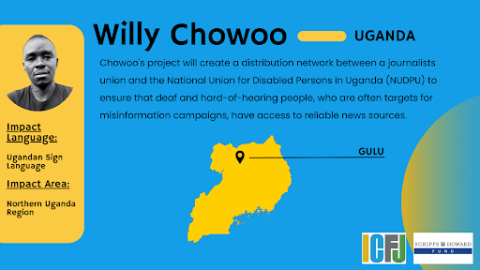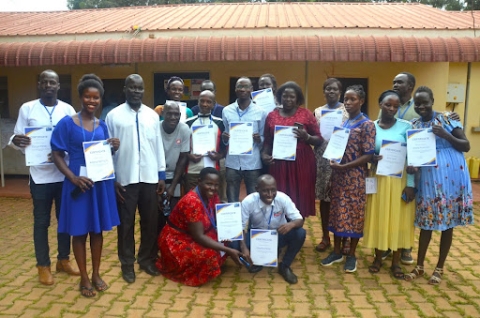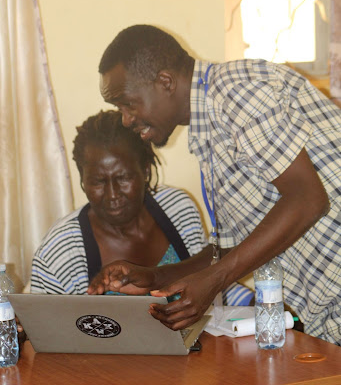
Reporters, sign language interpreters and other community members have forged a network in Uganda that is countering misinformation in the deaf community, as part of a project supported by the International Center for Journalists (ICFJ) and led by journalist Willy Chowoo.
Chowoo, who is based in the northern Ugandan city of Gulu, launched the Ugandan Sign Language Project with a grant from ICFJ’s Disarming Disinformation initiative, a three-year global effort with lead funding by the Scripps Howard Fund. He was one of 18 people from around the world who received training and funding through the program to test innovative ways of distributing the truth to counteract the spread of misinformation.
Chowoo began the project by training 15 sign language interpreters and five journalists on multimedia production, fact-checking, and news accessibility. Equipped with a training curriculum Chowoo developed and additional mentorship, ten of the participants went on to hold events for their own communities and build community distribution networks to help stop the spread of misinformation on the ground – amplifying the impact of the project.

A major success is the formation of the Network of Community Fact Checkers, a national WhatsApp group composed of deaf community members, sign language interpreters, and others who help disseminate verified information and digital inclusion initiatives. The network garnered about 100 members in just two months and is still growing strong.
“There is a need for a deliberate and concerted effort to tackle the spread of misinformation and disinformation before it could consume the whole deaf community,” said Chowoo, a journalist with more than 20 years of experience who now works for Nora Media Group/ 92.1 Choice FM and is the founder of CT Media Uganda.
In addition to media outlets, Chowoo partnered with the Uganda National Disabled Union chapter in Gulu and the Uganda Sign Language Interpreters’ Association.
The project kicked off with a week-long training in Gulu City in July. It was inaugurated by the deputy residence city commissioner and attracted participants from organizations such as the Northern Uganda Sign Language Association, the Gulu Disabled Persons Union, the Amuru Disabled Persons Union, the Gulu Women’s Disabled Union, churches, media clubs, radio organizations, and more. Roughly 60% of the participants were women and the majority were under 30 years of age.

"We thought nobody was thinking about us, but this project has shown us love, that we are not being left out," said Ocen Dominic, the chairperson of the Gulu District Deaf Association.
Future trainings in the project went on to prioritize educating women and community leaders, like pastors, as Chowoo realized that these groups have disproportionately high contact with deaf and disabled individuals. The training participants committed themselves to producing multimedia content for deaf audiences on a variety of politically and economically salient topics, including climate change, education, health and more.
Proceeding into August and September, the project continued with training and added further mentorship and promotion of the project’s opportunities through radio and social media.
Through these relationships, Chowoo hopes to show proof-of-concept for the efficacy of sign language distribution networks, as well as illustrate how deaf and hard-of-hearing people are part of valuable audience and professional communities that are currently being left out of counter-disinformation initiatives. He has already received numerous calls from other journalists interested in collaborating, as well as from representatives from various levels of government who want to discuss the potential to introduce this network model into formal policy initiatives.
Disarming Disinformation is run by ICFJ with lead funding from the Scripps Howard Fund. The three-year project empowers journalists, journalism students, and other media professionals to fight disinformation.